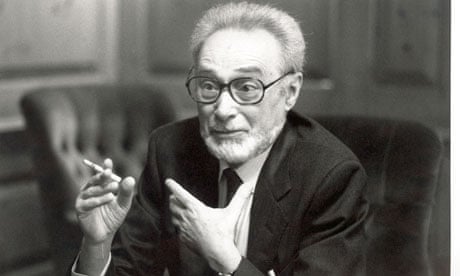Primo Levi's haunting memoir of life as a Jew in Mussolini's Italy told through the unlikely metaphor of chemistry has been named the best science book ever written.
The Periodic Table, published in 1975, fought off competition from Richard Dawkins, DNA legend James Watson, Tom Stoppard, Bertolt Brecht and Charles Darwin to win the vote at an event organised by the Royal Institution in London.
"This book pinions my awareness to the solidity of the world around me," said former Guardian science editor Tim Radford, who was the book's advocate at the event. "The science book is the ultimate in non-fiction," he told the Guardian's weekly science podcast. "You've got the entire universe and the entire sub-atomic world to choose from and everything that has happened in it."
Levi survived Auschwitz and later became a chemist in postwar Italy before committing suicide in 1987.
His memoir narrowly beat Stoppard's play Arcadia and King Solomon's Ring, the ecologist Konrad Lorenz's 1952 eulogy to the natural world, a book described by the event's chair, author Jon Turney, as "the most charming ever written by a Nazi".
But the book's champion, scientist and author Armand Leroi, urged readers to look beyond Lorenz's politics.
He said that the pioneering animal behaviourist had inspired him with his passionate descriptions of the natural world and the book still filled him with a "childlike wonder. It's the most simple and beautiful science you can imagine".
One book that did not make the shortlist was Oliver Sacks' A Leg to Stand on, which was nominated by Rowan Williams, the Archbishop of Canterbury. The work of the New York-based neurologist was made famous in the film Awakenings.
Dr Williams said the book "challenges all sorts of assumptions about mind and body, and sketches a very exciting concept of the body itself as 'taking shape' in mind and imagination".
The evolutionary biologist Steve Jones and broadcaster Vivienne Parry selected Darwin's account of his life-changing journey around the world, The Voyage of the Beagle.
The book, which charts Darwin's intellectual journey towards the theory of natural selection, was a good example of a serious work that conveys "the excitement of doing science", said Professor Jones.
But he added: "As well as a great science book, it's one of the best travel books ever written, with more adventures on a single page than most modern writers manage to squeeze into a chapter, or an entire book."
The shortlist
Primo Levi The Periodic Table
Konrad Lorenz King Solomon's Ring
Tom Stoppard Arcadia
Richard Dawkins The Selfish Gene
Other nominations
James Watson The Double Helix
Bertolt Brecht The Life of Galileo
Peter Medawar Pluto's Republic
Charles Darwin Voyage of the Beagle
Stephen Pinker The Blank Slate
Oliver Sacks A Leg to Stand On
